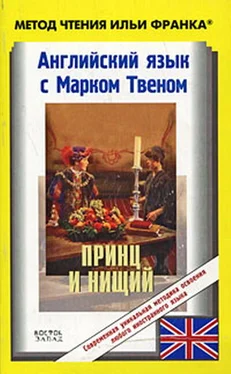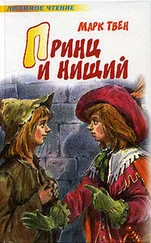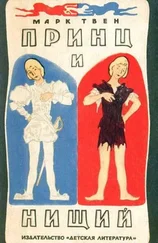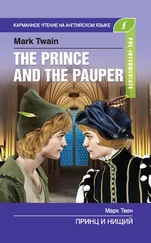This remark sobered the father's joviality, and brought his mind to business. He turned angrily upon the prince, and said:
'The morrow must we pay two pennies to him that owns this hole; two pennies mark ye — all this money for a half-year's rent, else out of this we go. Show what thou'st gathered with thy lazy begging.'
The prince said:
'Offend me not with thy sordid matters. I tell thee again I am the king's son.'
A sounding blow upon the prince's shoulder from Canty's broad palm sent him staggering into good-wife Canty's arms, who clasped him to her breast, and sheltered him from a pelting rain of cuffs and slaps by interposing her own person.
The frightened girls retreated to their corner; but the grandmother stepped eagerly forward to assist her son. The prince sprang away from Mrs. Canty, exclaiming:
'Thou shalt not suffer for me, madam. Let these swine do their will upon me alone.'
This speech infuriated the swine to such a degree that they set about their work without waste of time. Between them they belabored the boy right soundly, and then gave the girls and their mother a beating for showing sympathy for the victim.
'Now,' said Canty, 'to bed, all of ye. The entertainment has tired me.'
The light was put out, and the family retired. As soon as the snorings of the head of the house and his mother showed that they were asleep, the young girls crept to where the prince lay, and covered him tenderly from the cold with straw and rags; and their mother crept to him also, and stroked his hair, and cried over him, whispering broken words of comfort and compassion in his ear the while. She had saved a morsel for him to eat also; but the boy's pains had swept away all appetite — at least for black and tasteless crusts. He was touched by her brave and costly defense of him, and by her commiseration; and he thanked her in very noble and princely words, and begged her to go to sleep and try to forget her sorrows. And he added that the king his father would not let her loyal kindness and devotion go unrewarded. This return to his 'madness' broke her heart anew, and she strained him to her breast again and again and then went back, drowned in tears, to her bed.
As she lay thinking and mourning (пока она лежала, думая и скорбя), the suggestion began to creep into her mind (предположение начало закрадываться в ее ум) that there was an undefinable something (что было что-то неопределенное) about this boy (в этом мальчике) that was lacking (чего недоставало) in Tom Canty (в Томе Кэнти), mad or sane (сумасшедшем или здоровом). She could not describe it (она не могла описать это), she could not tell just what it was (она не могла сказать, что это было), and yet her sharp mother-instinct (и все же ее острый материнский инстинкт) seemed to detect it and perceive it (касалось, опознал и воспринял его). What if the boy were really not her son, after all (что если мальчик действительно был не ее сын, в конце концов)? Oh, absurd (ох, это абсурд)! She almost smiled at the idea (она почти улыбнулась этой мысли), spite of her griefs and troubles (несмотря на тревоги и горести). No matter (неважно), she found that it was an idea that would not 'down' (она обнаружила, что это была такая мысль, которая никак не проходила), but persisted in haunting her (но продолжала преследовать ее). It pursued her (она преследовала ее), it harassed her (она тревожила ее), it clung to her (она липла к ней; to cling — липнуть, льнуть), and refused to be put away or ignored (и отказывалась быть отложенной в сторону или игнорированной). At last she perceived (наконец она осознала) that there was not going to be any peace for her (что не будет ей никакого покоя) until she should devise a test (пока она не изобретет способ проверки) that should prove (которая должна доказать), dearly and without question (дорого и без (дальнейших) вопросов), whether this lad was her son or not (был этот мальчик ее сыном или нет), and so banish these wearing and worrying doubts (и таким образом отогнать эти надоедливые и беспокоящие сомнения). Ah, yes (ах, да), this was plainly the right way out of the difficulty (это был точно правильный путь из этой сложной ситуации); therefore (поэтому), she set her wits to work at once (она принялась думать сразу же) to contrive that test (чтобы придумать эту проверку). But it was an easier thing to propose than to accomplish (но это было легче планировать, чем достигнуть). She turned over in her mind (она прокручивала в голове) one promising test after another (один многообещающий способ проверки за другим; to promise — обещать), but was obliged (но была вынуждена) to relinquish them all (отмести их все) — none of them were absolutely sure (ни один из них не был абсолютно верным), absolutely perfect (абсолютно совершенным); and an imperfect one could not satisfy her (а несовершенный не мог удовлетворить ее). Evidently she was racking her head in vain (очевидно, она ломала голову напрасно; to rack — вздергивать на дыбу; мучить, пытать; раздирать душу) — it seemed manifest (казалось очевидным) that she must give the matter up (что она должна бросить эту затею; to give up — бросить привычку, затею, сдаться). While this depressing thought (пока эта гнетущая мысль) was passing through her mind (проходила через ее ум), her ear caught the regular breathing (ее ухо уловило равномерное дыхание) of the boy (мальчика), and she knew he had fallen asleep (и она поняла, что он заснул). And while she listened (и пока она слушала), the measured breathing was broken by a soft, startled cry (мерное дыхание было прервано мягким, испуганным криком), such as one utters in a troubled dream (как те, как человек: «один» издает в беспокойном сне). This chance occurrence furnished her instantly with a plan (эта случайность предоставила ей сразу план) worth all her labored tests combined (который стоил всех ее выдуманных проверок вместе взятых). She at once set herself feverishly, but noiselessly, to work to relight her candle (она сразу же принялась лихорадочно, но бесшумно вновь зажигать свечу), muttering to herself (бормоча себе под нос: «к себе»), 'Had I but seen him then (если бы я только увидела его тогда), I should have known (я бы сразу узнала)! Since that day (с того дня), when he was little (когда он был маленький), that the powder burst in his face (когда порох взорвался у него перед лицом), he hath never been startled of a sudden out of his dreams or out of his thinkings (он никогда не просыпался ото сна или мыслей), but he hath cast his hand before his eyes (но он всегда вскидывал руку перед глазами = прикрывал глаза рукой), even as he did that day (точно так, как он сделал в тот день), and not as others would do it (и не так, как другие сделали бы), with the palm inward (ладонью внутрь), but always with the palm turned outward (но всегда ладонью наружу) — I have seen it a hundred times (я видела это сотню раз), and it hath never varied nor ever failed (и это никогда не изменялось, и никогда не исчезало). Yes, I shall soon know now (да, теперь я скоро (все) узнаю)!
Читать дальше
Конец ознакомительного отрывка
Купить книгу




![Марк Твен - Принц и нищий [Издание 1941 г.]](/books/148799/mark-tven-princ-i-nichij-izdanie-1941-g-thumb.webp)







